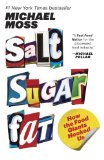Summary | Excerpt | Reviews | Beyond the Book | Readalikes | Genres & Themes | Author Bio

Critics' Opinion:
Readers' Opinion:
First Published:
Feb 2013, 480 pages
Paperback:
Feb 2014, 480 pages
 Book Reviewed by:
Book Reviewed by:
Poornima Apte
Buy This Book
The stickiest subject at Monell, however, is not sugar. It's money. Taxpayers fund about half of the center's $17.5 million annual budget through federal grants, but much of the rest of its operation comes from the food industry, including the big manufacturers, as well as several tobacco companies. A large golden plaque in the lobby pays homage to PepsiCo, Coca-Cola, Kraft, Nestlé, Philip Morris, among others. It's an odd arrangement, for sure, one that evokes past efforts by the tobacco industry to buy "research" that put cigarettes in a favorable light. At Monell, the industry funding buys companies a privileged access to the center and its labs. They get exclusive first looks at the center's research, often as early as three years before the information goes public, and are also able to engage some of Monell's scientists to conduct special studies for their particular needs. But Monell prides itself on the integrity and independence of its scientists. Some of their work, in fact, is funded with monies from the lawsuits that states brought against the tobacco manufacturers.
"At Monell, scientists choose their research projects based solely on their own curiosity and interests and are deeply committed to the pursuit of fundamental knowledge," the center said in response to my questions about its financial structure. Indeed, as I would discover, though Monell receives industry funding, some of its scientists sound like consumer activists when they speak about the power their benefactors wield, especially when it comes to children.
This tension between the industry's excitement about the research at Monell and the center's own unease about the industry's practices dates back to some of the center's earliest research on our taste buds—based on age, sex, and race. Back in the 1970s, researchers at Monell discovered that kids and African Americans were particularly keen on foods that were salty and sweet. They gave solutions of varying sweetness and saltiness to a group of 140 adults and then to a group of 618 children aged nine to fifteen, and the kids were found to like the highest level of sweet and salty—even more than the adults. Twice as many kids as adults chose the sweetest and saltiest solutions. (This was the first scientific proof of what parents, watching their kids lunge for the sugar bowl at the breakfast table, already knew instinctively.) The difference among adults was less striking but still significant: More African Americans chose the sweetest and saltiest solutions.
One of Monell's sponsors, Frito-Lay, was particularly interested in the salt part of the study, since the company made most of its money on salty chips. Citing Monell's work in a 1980 internal memo, a Frito-Lay food scientist summed up the finding on kids and added, "Racial Effect: It has been shown that blacks (in particular, black adolescents) displayed the greatest preference for a high concentration of salt." The Monell scientist who did this groundbreaking study, however, raised another issue that reflected his anxiety about the food industry. Kids didn't just like sugar more than adults, this scientist, Lawrence Greene, pointed out in a paper published in 1975. Data showed they were actually consuming more of the stuff, and Greene suggested there might be a chicken-and-egg issue at play: Some of this craving for sugar may not be innate in kids but rather is the result of the massive amounts of sugar being added to processed foods. Scientists call this a learned behavior, and Greene was one of the first to suggest that the increasingly sweet American diet could be driving the desire for more sugar, which, he wrote, "may or may not correspond to optimum nutritional practices."
In other words, the sweeter the industry made its food, the sweeter kids liked their food to be.
I wanted to explore this idea a bit more deeply, so I spent some time with Julie Mennella, a biopsychologist who first came to Monell in 1988. In graduate school, she had studied maternal behavior in animals and realized that no one was examining the influence that food and flavors had on women who were mothers. She joined Monell to answer a set of unknowns about food. Do the flavors of the food you eat transmit to your milk? Do they transmit to amniotic fluid? Do babies develop likes and dislikes for foods even before they are born?
Excerpted from Salt Sugar Fat by Michael Moss. Copyright © 2013 by Michael Moss. Excerpted by permission of Random House, a division of Random House, Inc. All rights reserved. No part of this excerpt may be reproduced or reprinted without permission in writing from the publisher.





The Funeral Cryer by Wenyan Lu
Debut novelist Wenyan Lu brings us this witty yet profound story about one woman's midlife reawakening in contemporary rural China.
Your guide toexceptional books
BookBrowse seeks out and recommends the best in contemporary fiction and nonfiction—books that not only engage and entertain but also deepen our understanding of ourselves and the world around us.